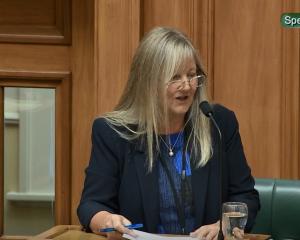The Labour Party is trying to redefine itself through a future of work policy aimed at the effects of automation and its impact on work security. On a visit to Dunedin, finance spokesman Grant Robertson spoke to political reporter Eileen Goodwin about the project he is spearheading.
Phrases like "social entrepreneurship'' and "flexicurity'' are part of the lingo for Labour's Grant Robertson as he grapples with big changes to the party's policy on work.
Labour is taking seriously the predictions of robots putting swathes of workers out of jobs, and its Dunedin-raised finance spokesman is charged with leading its future of work project.
"We really are trying hard with the future of work commission to be as positive as possible, because it is scary, and job losses are not good,'' Mr Robertson said in Dunedin yesterday.
Surprisingly, some of the lowest paid workers - like care support workers - were more protected from the threat of automation than highly paid professions like lawyers and accountants.
"It's one of the great ironies - that's absolutely true.
"Anything in the caring or people professions - teaching for instance - despite the growth of online courses, you still need people in front of you.''
He believed a fundamental rethink was needed in the way low-paid and unpaid work was viewed.
Jobs would be more short-term, flexible, and casual; the buzzword "flexicurity'' conveyed how changes could be accommodated without incurring downsides for workers.
He described economic inequality as the "burning social issue of our time'', and it was hoped the response to the work challenge could make society fairer.
Just how this will be effected has not been spelled out yet.
The party was entertaining the idea of a "universal basic income'' across the population, but the largely untested concept was "highly unlikely'' to emerge as part of the final future of work report.
The already announced three free years of post-school education would form a central part of the plan, and had been well received, he said.
The party was also keen to explore "flexicurity'', a Danish concept whereby people could be supported at a good level of income to retrain after losing their job.
He enthused about the "social entrepreneurship phenomenon'' in which people tried to make money from doing jobs that improved society.
It sounds positive, but is not exactly reminiscent of the rhetoric of a workers' party.
"That's great, I don't have any problems with that whatsoever, as long as those people continue to pay their taxes and contribute to society.
"That's one of the paradigm shifts we have to get into our heads.''
What all this meant for unions was a "big question'', but they remained central for ensuring workers' wellbeing.
Mr Robertson cited the growth of the Freelancers Union in the United States as proof unions were relevant for contract or freelance workers.
Asked if automation was like climate change in respect of getting people to take it seriously, he said it was, but the effects of climate change were more certain.
"I can't tell you exactly what's going to happen [with automation], but that doesn't mean we shouldn't prepare.''
"I believe that's kind of what the Government is doing ... that leaves a huge number of people very vulnerable.''
For New Zealand to retain its standard of living, it had to face up to the challenge and turn it to an advantage, he said.
And what about the working conditions in the Labour caucus itself after years of rifts and division?
He said caucus felt more unified than it had at any other time during his more than seven years as an MP.
"You'll always have the odd little blip, which we had around the TPP with Phil [Goff] and David [Shearer],'' he said, referring to the disagreement over the controversial trade pact.












